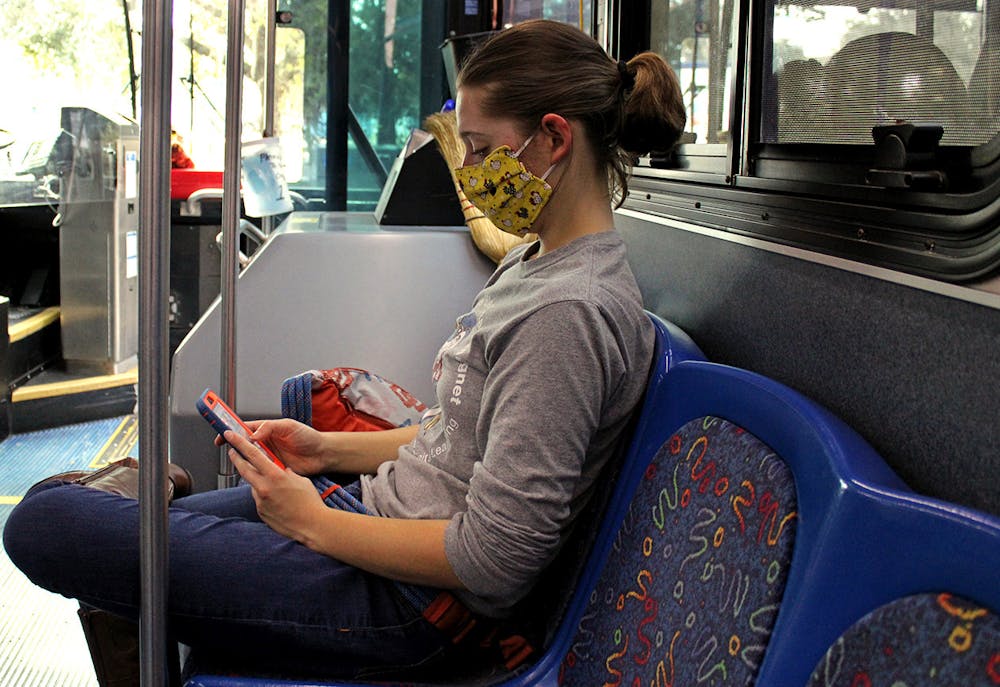As the city celebrated its 50th anniversary of the Regional Transit System, the future of Gainesville’s sustainable transportation was called into question.
The city announced April 9 UF is considering a significant reduction in funding for the city’s Regional Transit System. The potential cuts have raised questions about the future of transportation in Gainesville and what that could mean for a city impacted by climate change.
The RTS system was established in 1974, and much of its history has been entwined with UF. For the 2024 fiscal year, UF contributed $13.7 million out of the total $28.5 million in RTS funding — making up about half of the program’s total revenue.
Under the newly proposed plan, UF would switch to a contract of monthly payments and reduce its total funding to $6.8 million annually. This reduction of more than 50% would be detrimental to the RTS system, the city said.
In response to the proposed changes, the Gainesville City Commission held a special meeting April 11. The city’s chief operating officer, Andrew Persons, outlined potential impacts of the funding cuts during the meeting.
If the changes were to occur, 11 of the 39 current RTS routes would be eliminated as of July 1. This would include all five on-campus routes, as well as the route to the Gainesville Regional Airport. Services for an additional 11 routes would be reduced, with a decrease in service hours and weekend run-times.
The RTS fleet would be reduced by 36 buses, which would eliminate more than 50 staffed positions, the city said. The proposed plan would also violate the RTS contract with the Amalgamated Transit Unit and threaten the city’s eligibility for federal and state transportation grants.
UF stated there had been a “major misunderstanding” on the city’s part. Dave Kratzer, the senior vice president for construction, facilities and auxiliary, sent a letter to Gainesville Mayor Harvey Ward April 11, calling for a release of RTS data on operating costs. Non-UF riders are charged $1.50 per ride, Kratzer wrote, while UF students pay an average of $2.86 per ride.
“Press conferences and threats of closures are unnecessary and unhelpful,” Kratzer wrote. “We would welcome you back to the table and hope that you will direct your team to provide this crucial data that we have not yet received.”
When asked about the letter, City Commissioner Casey Willits said the RTS system is not merely based on the fare box. The difference in fares doesn’t reflect the true cost of the whole system, he said, which is something UF is purposely choosing not to understand.
“When they fully grasp how transit is funded… I think we’ll come to an understanding that it is a great relationship, and any cut is going to have far worse impacts than they imagined,” Willits added.
Willits also expressed concerns for the future of the city’s climate action plan, which is expected to have a completed first draft by the end of 2024. Part of that climate action plan involved a commitment to sustainable transportation.
Out of the current RTS fleet, four buses are electric. That was expected to expand over the coming years, with the eventual goal of an 80% electric fleet by 2045. The city estimates that, under the proposed funding cuts, more than 9,000 additional daily car trips will be created, leading to more carbon emissions and traffic congestion.
“In order to get to our goals, we need to be consistently moving people towards zero carbon transportation,” Willits said. “A big portion of that has got to be public transportation, and changing some of that public transportation to electric vehicles.”
Gainesville Chief Climate Officer Dan Zhu declined to comment on how the proposed funding cuts would impact the city’s climate action plan.
UF is also developing a new climate action plan, or CAP 2.0. The first climate action plan, developed in 2009, set a goal for the university to be carbon neutral by 2025. Currently, a release date for CAP 2.0 hasn’t been set.
CAP 2.0 has several central goals, one of which is sustainable transportation. Yet the current draft of CAP 2.0 doesn’t address the fundamental causes of climate change, UF biology professor Stephen Mulkey said.
Mulkey teaches multiple classes based around climate change and sustainability, and said real action needs to be taken on the university’s part in order to neutralize the impacts of climate change.
“Most people fail to grasp the sweep and the scope of the changes that need to be made to truly address climate change,” he said. “If we want to actually walk the talk instead of paying lip service to sustainability, we’ve got to invest in it.”
One of the most concerning impacts of not investing in sustainable transportation is the potential for adverse health effects, Mulkey said. Gas-burning vehicles produce tiny, inhalable particles that can cause heart attacks, strokes and respiratory infections. Fossil fuel air pollution is responsible for one in five deaths worldwide, according to research from Harvard University.
Diesel-burning buses still contribute to this issue, Mulkey said, which means they’re not a perfect solution. Yet they do reduce the amount of cars on the road, he said, which is a step in the right direction.
“Public transport is at the heart of a sustainable community,” he said.
Nathaniel Pelton, an off-campus UF student senator for UF student government and the chair of the Senate Transportation Caucus, said he’s against the proposed funding cuts to RTS. RTS connects many students to their way of life, Pelton said, making it vital for accessibility.
Pelton also helped introduce the UF Green New Deal, and said the proposed cuts are in direct defiance of its goals. The deal showed students want a greener community, he said, and reducing RTS services would be debilitating for that vision.
Much of the UF funding to RTS comes from students’ pockets, Pelton said. During its public meeting April 16, Pelton said the student Senate plans to discuss the potential funding cuts and what it would mean for students.
“This is going so many decades backward in progress for the climate advocates that have made this campus better,” he said.
Contact Kylie Williams at kyliewilliams@alligator.org. Follow her on X @KylieWilliams99






